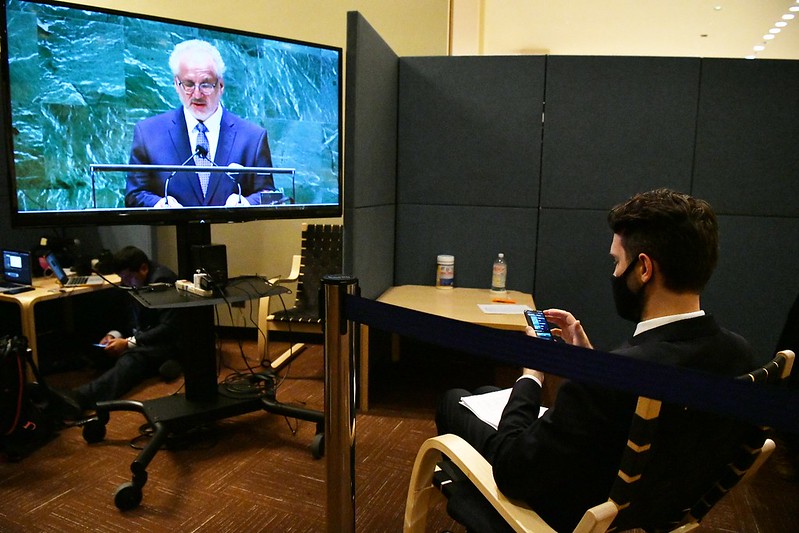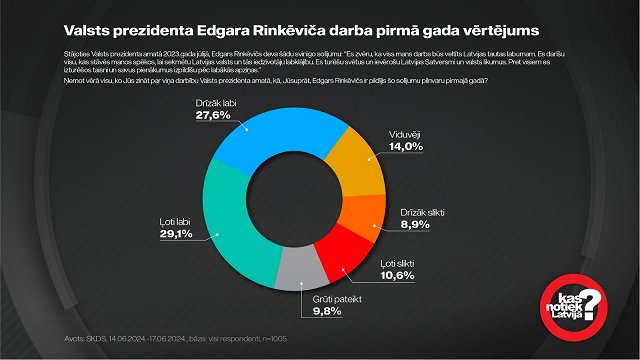In the speech he advocated for "greater openness of the UN Security Council" and "'the beginning of text-based negotiations on Security Council reform" while making a pitch for Latvia's inclusion on the Security Council as a temporary member.
He also brought up one of his favorite topics, namely, the challenges posed by artificial intelligence, even going so ar as to say "The main challenge for the democratic world in the coming decades will be whether artificial intelligence or humans control decisions" and assert "I consider the protection of autonomy of human thought to be the most important task for legal policy in the coming decades".
The full text of the speech is reproduced below.
Mr President, excellencies, ladies and gentlemen! Let me begin by congratulating you, Minister of Foreign Affairs of the Maldives, Mr Abdulla Shahid, on taking up the honourable position of President of the 76 th Session of the UN General Assembly. I can assure you of Latvia’s full cooperation. I also warmly welcome the appointment of Antonio Guterres as UN Secretary-General for another term. The Secretary-General has made considerable efforts to strengthen the effectiveness of the UN system. The new report by the Secretary-General, namely “Our Common Agenda”, provides us with a vision and choices for the future.
I
Pandemic challenges and solutions
The Covid-19 pandemic has not yet been overcome. The current global challenge is to achieve the widest possible vaccination as soon as possible.
Latvia provides support to increase the availability of vaccines worldwide. Latvia has sent vaccines to its closest neighbours, as well as friends in Africa and Asia, and we plan to continue to share vaccines, including through the COVAX mechanism.
II
Disinformation
This crisis has highlighted the need to continuously strengthen the resilience of countries and societies. COVID-19 highlighted the vulnerability of our societies to all kinds of disinformation. Latvia’s response to combating disinformation is based on strengthening public resilience – by raising awareness of disinformation; strengthening independent and pluralistic media; the involvement of civil society; and teaching media literacy.

Combating such disinformation that creates serious harm to society, while protecting and strengthening freedom of expression and data privacy in the digital world, is an extremely complex challenge. The lines between freedom of speech, accountability and censorship are thin and fragile.
The freedom of expression as a universal human right can be limited only in extreme cases. Such limitations should not be managed by the global internet platforms. Instead, in democratic societies, this function should be exercised only by democratically mandated institutions.
At the global level, combating disinformation effectively requires even closer understanding and cooperation in international organizations. Latvia was one of the initiators of the UN General Assembly resolution on the promotion of media and information literacy at the global level adopted this year. We will continue to provide support to partners with our expertise in combating disinformation. Efforts at the UN level need to be strengthened.
III
Investment in sustainable digital solutions
Latvia was one of the first countries in the world to develop several digital solutions important for a sustainable response to the pandemic.
Due to the fact that almost every corner of Latvia has access to high-speed internet, many people have used these solutions during the pandemic to change their habits and shape their daily lives.
They contribute, inter alia, to the convergence of quality of life and income levels between urban and rural areas. In many cases, digital solutions have reduced the need to commute, which helps to limit emissions.
At the same time, we must bear in mind that digital transformation and artificial intelligence poses new risks. Also, security threats in cyberspace are increasing. Therefore, in parallel with technological developments, we must work actively to define new legal principles.
On the one hand, these principles should help us make the best use of opportunities and, on the other, to avoid risks and damage to human rights and freedoms.
In recent years we see innovations which, through global social platforms and increasing use of artificial intelligence, make it possible to influence and manipulate human thoughts and actions more effectively.
Thus, human autonomy, the free will of the personality is endangered. The main challenge for the democratic world in the coming decades will be whether artificial intelligence or humans control decisions.
When individual scientists and environmental activists began to express concerns about climate issues in the 1990s, few listened to them. It takes time for public opinion and legal consciousness to mature.
Today, we are grateful to them for raising the alarm early. Looking ahead, I consider the protection of autonomy of human thought to be the most important task for legal policy in the coming decades.
We must also ensure that the digital transformation is inclusive for all countries and all people, bridging the current digital divide.
Another important aspect for Latvia is the preservation of linguistic diversity and the use of small languages in the digital age. Latvian digital technology companies are developing a high-quality machine translation program for small languages. This will help to safeguard linguistic diversity in the digital age. Latvia is also proud of the project “Riga TechGirls”, which offers better digital skills and opportunities to women. We are happy to share this experience with others through the UN system.
Latvia supports the UN Technology Facilitation Mechanism to identify how science, technology and innovation can best contribute to delivering sustainable development goals.
IV
Climate; environment
Mr President,
There is an urgent need to reach our common goals on the environment, climate change and renewable energy.
The COP26 climate change conference in Glasgow later this year will be an important milestone.
Latvia is committed to meeting the goals of the Paris Climate Agreement and has adopted an ambitious development strategy that aims to minimize carbon production.
There is a need to make greater use of innovative technologies for the prudent and sustainable use of natural resources. Latvia continues to expand its experience of sustainable forest management using digital technologies.
In the coming years, we will continue to pay special attention to the issue of clean water in a national, regional and global context.
Latvia has a long coastline. We can share our accumulated knowledge about monitoring and combating marine pollution. Latvia is also actively involved in the UN Group of Friends to Combat Marine Plastic Pollution.
V
SDG16; human rights; security; Afghanistan; Belarus; Ukraine
Mr President,
With regard to the UN Sustainable Development Goals, we are especially committed to promoting peace, justice and good governance. It is good governance that is crucial for respect for all human rights, democratic principles and the rule of law.
Therefore, in its development cooperation, Latvia focuses on public administration, the rule of law, gender equality and environmental protection.
More than ever, human rights need to be a strategic priority for the UN. Over the past year, we have witnessed negative developments in regard to basic human rights and security issues, for example in Myanmar and Tigray.
New tragedies in Afghanistan are now unfolding before our eyes. Taking into account the latest developments, we are especially concerned about the security of Afghan women and girls. The rights of women and girls will be high on our agenda as Latvia serves as the Vice-Chair on the Bureau of the UN Commission on the Status of Women for the next two sessions.
Over the past year, Latvia has also closely followed the dramatic developments in its neighbouring country – Belarus, where public efforts to decide on the future of its country are still being brutally suppressed.
Latvia strongly condemns the actions of the Lukashenko regime against Belarusian civil society, independent media and journalists. It has even gone so far as to hijack an international flight.
Belarus exploits and puts at great risk vulnerable people from different regions of the world in an effort to create targeted, intensive migratory flows to Lithuania, Latvia and Poland, in order to destabilize Europe.
We have a duty and a right to protect our national border! At the same time, Latvia, in cooperation with its NGOs, provides humanitarian assistance to people who have become hostages of the Lukashenko regime.
The crisis in Belarus can only be resolved by new, free and fair presidential elections in the presence of international observers.
Meanwhile, Russia’s military intimidation campaign against Ukraine continues. This confirms the need for the international community to support Ukraine’s independence, sovereignty and territorial integrity.
Latvia sees the newly established International Crimean Platform as a valuable format for keeping the issue of Crimean de-occupation on the international agenda. We call for the widest possible engagement of the international community in the Crimean Platform.
Furthermore, the frozen conflicts in the Moldovan territory of Transnistria and the Georgian territories of Abkazia and South Ossetia, should be solved in accordance with international law, with full respect for the territorial integrity of Moldova and Georgia.
VI
UN revitalization
Mr President,
A few days ago, on 17 September, we marked 30 years since Latvia, together with Lithuania and Estonia, returned as full members of the international community and joined the United Nations.
For thirty years, Latvia has clearly demonstrated its commitment to democratic values and respect for international law.
Our experience in strengthening statehood, rule of law and good governance lets us better understand similar efforts elsewhere.
Latvia has also made a practical contribution to global peace by sending 158 experts to participate in eight international missions and operations around the world. We are determined to continue to contribute to peace-building processes by actively participating in the UN Peacebuilding Commission in 2022.
Latvia has shown that it can effectively contribute to solving global security challenges. Therefore, Latvia aims to become a non-permanent member of the UN Security Council in the term 2026–2027.
A new generation has grown up in the last 30 years. In Latvia, like elsewhere, youth are deeply concerned about the climate crisis and about disinformation. They want to build inclusive societies where people of all generations, backgrounds and communities can feel included not only formally, but in practice.
In order to meet the challenges of the modern age, the UN and its Security Council must show willingness to change and implement long overdue reforms. As member of the Accountability, Cohesion, Transparency Group, Latvia advocates for greater openness of the UN Security Council. Latvia would strongly support the beginning of text-based negotiations on Security Council reform. The reform should ensure more equitable representation from African, Latin American and Eastern European countries.
Mr President,
It is in the interests of every state to defend an international system based on rules and rights, in order to maintain global security and sustainable growth. The UN is at the heart of multilateralism and the rules-based international order.
No state is big enough to resolve alone the complex challenges we face today. Therefore, let each of us offer constructive solutions! The need for an effective United Nations is now greater than ever.
Thank you!



























